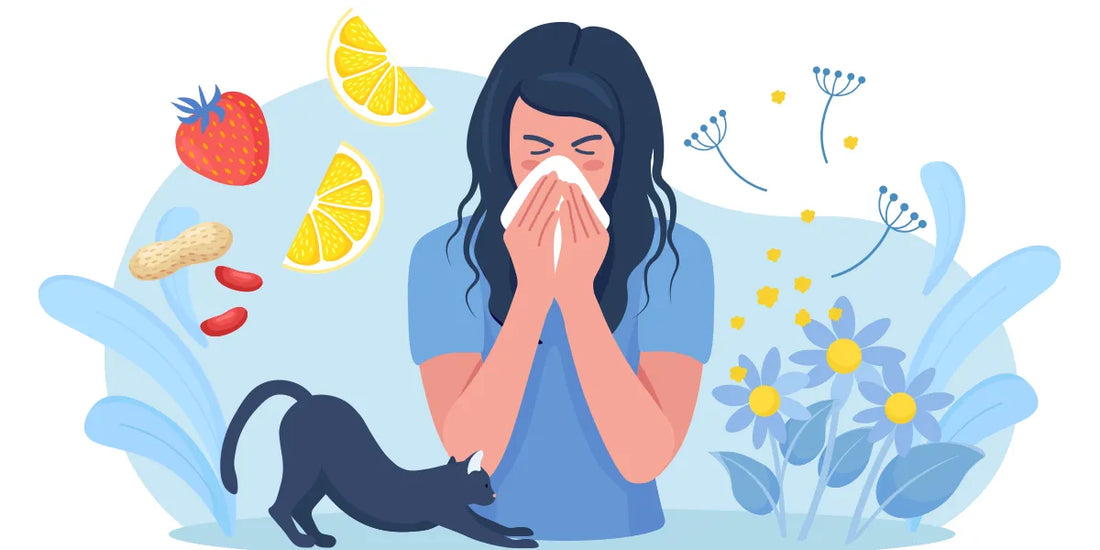
The Link Between Allergies and Bladder Leaks: What You Should Know
Share
Spring is in the air—bringing blooming flowers, warmer weather, and unfortunately for many, seasonal allergies. While most people associate allergies with sneezing, itchy eyes, and congestion, few realize that these seasonal reactions can also impact bladder health. For those managing adult incontinence, spring allergies may exacerbate symptoms, leading to increased bladder leaks and discomfort.
Understanding the connection between allergies and bladder leaks is essential for managing both conditions effectively. From the role of histamines to the side effects of common allergy medications, several factors can influence bladder control during allergy season. Fortunately, by adopting a few mindful strategies and choosing the right incontinence products, you can minimize irritation and maintain comfort throughout the spring months.
How Allergies Affect Bladder Control
Allergies are the immune system's overreaction to substances like pollen, dust, and mold. When exposed to allergens, the body releases histamines—chemicals that trigger inflammation and other allergy symptoms. This immune response can have a surprising impact on bladder function in several ways:
-
Increased Bladder Sensitivity:
Histamines released during an allergic reaction may irritate the bladder lining, increasing sensitivity and contributing to urinary urgency and frequent urination. -
Chronic Coughing and Bladder Leaks:
Seasonal allergies often cause persistent coughing or sneezing. These sudden, forceful actions put pressure on the bladder and pelvic floor muscles, increasing the likelihood of stress incontinence and bladder leaks. -
Dehydration from Antihistamines:
Many people rely on over-the-counter antihistamines to relieve allergy symptoms. However, these medications can have a drying effect on the body, which may lead to concentrated urine that irritates the bladder and worsens leakage. -
Pelvic Floor Weakness:
Repeated coughing or sneezing over time can weaken pelvic floor muscles, making it harder to control bladder leaks, especially for those already managing adult incontinence.
By understanding these connections, you can take proactive steps to manage bladder health during allergy season.
Managing Allergy-Induced Bladder Leaks
If you experience bladder leaks that seem to worsen with seasonal allergies, you are not alone. Fortunately, there are several effective ways to mitigate symptoms and improve your quality of life.
1. Choose Bladder-Friendly Allergy Relief
Certain medications can worsen urinary incontinence, while others are safer options. Here are some tips to choose the right allergy treatment:
-
Opt for Non-Drowsy Antihistamines:
Some older antihistamines, like diphenhydramine, have drying effects that can irritate the bladder. Newer, non-drowsy options such as loratadine or cetirizine may be less likely to cause bladder irritation. -
Use Saline Nasal Sprays:
These can relieve nasal congestion without the side effects that impact bladder function. Saline sprays are a gentle option that won’t exacerbate urinary symptoms. -
Consult Your Doctor:
If over-the-counter treatments are causing problems, a healthcare provider can suggest alternatives that are gentler on the bladder and compatible with managing adult incontinence.
2. Stay Hydrated Without Overloading Your Bladder
Proper hydration is essential for bladder health, but it’s important to strike a balance:
-
Sip Water Regularly:
Drink water throughout the day in small amounts rather than consuming large quantities at once. This can prevent bladder irritation without overloading your system. -
Limit Irritants:
Reduce consumption of bladder irritants like caffeine, alcohol, and carbonated beverages. These drinks can increase urinary frequency and exacerbate incontinence symptoms. -
Monitor Fluid Intake Before Bed:
To prevent nighttime bladder leaks, avoid drinking large amounts of liquid within two hours of bedtime.
3. Practice Pelvic Floor Exercises
Strengthening the pelvic floor muscles through exercises like Kegels can improve bladder control, especially if you experience leaks due to coughing or sneezing.
How to Perform Kegels:
-
Identify the correct muscles by stopping your urine midstream.
-
Squeeze and hold for five seconds, then relax for five seconds.
-
Repeat this 10-15 times per session, aiming for three sessions daily.
Consistency is key—over time, these exercises can strengthen muscles and reduce bladder leakage.
Lifestyle Adjustments for Bladder Wellness
In addition to managing allergies, adopting bladder-friendly lifestyle changes can make a big difference in urinary health. Consider these simple but effective habits:
-
Maintain a Healthy Weight: Extra weight can put pressure on the bladder, increasing the risk of stress incontinence.
-
Avoid Bladder Irritants: Spicy foods, artificial sweeteners, and acidic beverages may trigger bladder sensitivity.
-
Prioritize Regular Bowel Movements: Constipation can worsen bladder leakage by placing pressure on the bladder. Increase fiber intake to support digestion.
When to Seek Professional Help
If allergy season significantly affects your bladder control or if you notice a sudden change in symptoms, it may be time to consult a healthcare professional. They can help identify underlying causes, recommend appropriate treatments, and offer personalized solutions for managing both allergies and incontinence.
Signs You Should Consult a Doctor:
-
Increased frequency or urgency that disrupts daily life
-
Persistent bladder pain or burning sensations
-
Difficulty emptying your bladder completely
-
Frequent nighttime bladder leaks despite lifestyle adjustments
A healthcare provider can offer diagnostic tests and tailored treatment plans to address your specific needs. For example, they may suggest specialized physical therapy to strengthen your pelvic floor or prescribe medications that manage incontinence without exacerbating allergy symptoms.
Tracking your symptoms is also crucial. Keep a bladder diary to document patterns, triggers, and the severity of leakage. This record can provide valuable insights for your doctor, ensuring a more personalized and effective treatment plan.
Embracing a Holistic Approach to Wellness
Managing both allergies and bladder leaks requires a comprehensive strategy that includes medical guidance, lifestyle changes, and the right products. By taking a holistic approach, you can improve bladder health while minimizing the effects of seasonal allergies.
Simple habits like maintaining a balanced diet, managing stress, and engaging in regular physical activity all support long-term bladder wellness. Combined with mindful hydration and pelvic floor exercises, these changes can make a profound difference in controlling adult incontinence.
By staying proactive and seeking professional guidance when needed, you can enjoy greater comfort and confidence during allergy season and beyond.
Find Reliable Protection with TREST
For those managing adult incontinence, the right protection can make all the difference. TREST offers premium incontinence products designed to provide superior absorbency, comfort, and discreet protection. Whether you're dealing with occasional leaks or require overnight support, TREST's innovative solutions help you maintain your active lifestyle with confidence.
Investing in high-quality incontinence products not only enhances bladder management but also allows you to focus on enjoying life—without worrying about leaks.
